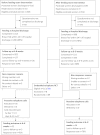The FEeding Support Team (FEST) randomised, controlled feasibility trial of proactive and reactive telephone support for breastfeeding women living in disadvantaged areas
- PMID: 22535790
- PMCID: PMC3341594
- DOI: 10.1136/bmjopen-2011-000652
The FEeding Support Team (FEST) randomised, controlled feasibility trial of proactive and reactive telephone support for breastfeeding women living in disadvantaged areas
Abstract
Objective: To assess the feasibility of implementing a dedicated feeding support team on a postnatal ward and pilot the potential effectiveness and cost-effectiveness of team (proactive) and woman-initiated (reactive) telephone support after discharge.
Design: Randomised controlled trial embedded within a before-and-after study. Participatory approach and mixed-method process evaluation.
Setting: A postnatal ward in Scotland.
Sample: Women living in disadvantaged areas initiating breast feeding.
Methods: Eligible women were recruited to a before-and-after intervention study, a proportion of whom were independently randomised after hospital discharge to intervention: daily proactive and reactive telephone calls for ≤14 days or control: reactive telephone calls ≤ day 14. Intention-to-treat analysis compared the randomised groups on cases with complete outcomes at follow-up.
Primary outcome: any breast feeding at 6-8 weeks assessed by a telephone call from a researcher blind to group allocation.
Secondary outcomes: exclusive breast feeding, satisfaction with care, NHS costs and cost per additional woman breast feeding.
Results: There was no difference in feeding outcomes for women initiating breast feeding before the intervention (n=413) and after (n=388). 69 women were randomised to telephone support: 35 intervention (32 complete cases) and 34 control (26 complete cases). 22 intervention women compared with 12 control women were giving their baby some breast milk (RR 1.49, 95% CI 0.92 to 2.40) and 17 intervention women compared with eight control women were exclusively breast feeding (RR 1.73, 95% CI 0.88 to 3.37) at 6-8 weeks after birth. The incremental cost of providing proactive calls was £87 per additional woman breast feeding and £91 per additional woman exclusively breast feeding at 6-8 weeks; costs were sensitive to service organisation.
Conclusions: Proactive telephone care delivered by a dedicated feeding team shows promise as a cost-effective intervention for improving breastfeeding outcomes. Integrating the FEeding Support Team (FEST) intervention into routine postnatal care was feasible.
Trial registration number: ISRCTN27207603. The study protocol and final report are available on request.
Conflict of interest statement
Figures
References
-
- World Health Organization Global Strategy for Infant and Young Child Feeding. http://www.who.int/nutrition/topics/global_strategy/en/index.html (accessed Feb 2012).
-
- Chung M, Raman G, Trikalinos T, et al. Interventions in primary care to promote breastfeeding: an evidence review for the U.S. Preventive Services Task Force. Ann Intern Med 2008;149:565–82 - PubMed
-
- Britton C, McCormick FM, Renfrew MJ, et al. Support for breastfeeding mothers. Cochrane Database Syst Rev 2007;(1):CD001141. - PubMed
-
- Graffy J, Taylor J. What information, advice, and support do women want with breastfeeding? Birth 2005;32:179–86 - PubMed
Grants and funding
LinkOut - more resources
Full Text Sources
Molecular Biology Databases
Miscellaneous

